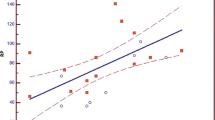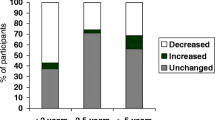Abstract
Background
Subjects referred to genetic counselling for cancer may have heightened perceptions of illness and death, even though they are healthy and this may cause anxiety and reluctance to follow through with consultation. We investigated such perceptions before and after counselling and genetic testing for cancer in a cohort of Italian women. We sought to understand the situation of the women referred by designing questionnaires administered to women at high risk of breast and/or ovarian cancer (those who had had a pathogenic mutation identified in a family member via diagnostic testing). We also assessed women after the diagnosis of breast cancers, but free of disease, to help determine risks in their families.
Methods
The first questionnaires were administered before initial counselling, and the second were completed within 20 days after the counselling. When a genetic test was proposed, the individual was asked to fill in a third questionnaire; the final questionnaire was administered after the person had received the results of the genetic test.
Results
We evaluated 204 subjects. Before counselling, 89 % of the subjects were worried about their risk of disease, 52 % felt “different” because of their personal and family history, and 39 % declared that their life choices were influenced by their fear of cancer. After counselling, 82 % of the subjects felt more relived about their pre-existing fears and stated that this process of being seen in a clinic with genetic expertise had clarified the meaning of disease risk for them, and for 50 %, this experience had positively influenced their life choices. Thirty percentage of the subjects had a positive test; all of them felt safer in being cared for by specifically trained staff. Fifty percentage had a less informative test (e.g. “wild-type” gene found); 84 % of them were not worried by the uncertainty, and overall, 96 % considered counselling to be very useful.
Conclusion
Candidates for genetic counselling frequently had heightened their perception of being ill, which influenced their ability to make life decisions. Genetic counselling often improves this perception, especially in subjects who have negative tests and this knowledge facilitates their life plans. After testing, most women felt satisfied and safer because of being properly followed by professionally trained and sympathetic staff. In conclusion, knowledge of the real individual risk, the presence of a professional team, and the possibility of entering a programme of controlled screening enable patients rather than living in fear and uncertainty to be less anxious about their state of health and to live with the knowledge that they are doing everything possible to care for themselves, aided by a specialized team, and that, if necessary, they would be able to take part in investigational studies.
Similar content being viewed by others
Abbreviations
- QAa:
-
Questionnaire Aa: before counselling
- QAb:
-
Questionnaire Ab: after counselling
- QG:
-
Questionnaire G: why are you going to have the genetic test
- QGP:
-
Questionnaire GP: to evaluate the emotional impact of the response to a positive test
- QGN:
-
Questionnaire GN: to evaluate the emotional impact of the response to a negative test
- QGW:
-
Questionnaire GW: to evaluate the emotional impact of the response to a non-informative test
References
Andrews L, Meiser B, Apicella C et al (2004) Psychological impact of genetic testing for breast cancer susceptibility in women of Ashkenazi Jewish background: a prospective study. Genet Test 8:240–247
Beran TM, Stanton AL, Kwan L et al (2008) The trajectory of psychological impact in BRCA1/2 genetic testing: does time heal? Ann Behav Med 36:107–116
Bisecker BB, Boehnke M, Calzone K et al (1993) Genetic counseling for families with inherited susceptibility to breast and ovarian cancer. JAMA 269:1970–1974
Bjorvatn C, Eide GE, Hanestad BR et al (2007) Risk perception, worry and satisfaction related to genetic counseling for hereditary cancer. J Genet Couns 16:211–222
Brain K, Gray J, Norman P, France E et al (2000) Randomized trial of a specialist genetic assessment service for familial breast cancer. J Natl Cancer Inst 92(16):1345–1351
Braithwaite D, Emery J, Walter F et al (2006) Psychological impact of genetic counseling for familial cancer: a systematic review and meta-analysis. Fam Cancer 5:61–75
Caiata-Zufferey M (2015) Genetically at-risk status and individual agency. A qualitative study on asymptomatic women living with genetic risk of breast/ovarian cancer. Soc Sci Med 132:141–148
Cella D, Hughes C, Peterman A et al (2002) A brief assessment of concerns associated with genetic testing for cancer: the multidimensional impact of cancer risk assessment (MICRA) questionnaire. Health Psychol 21:564–572
Christinat A, Pagani O (2013) Practical aspects of genetic counseling in breast cancer: lights and shadows. Breast 22(4):375–382
Claus EB, Schildkraut JM, Thompson WD, Risch NJ (1996) The genetic attributable risk of breast and ovarian cancer. Cancer 77:2318–2324
Croyle RT, Lerman C (1999) Risk communication in genetic testing for cancer susceptibility. J Natl Cancer Inst Monogr 25:59–66
Croyle RT, Smith KR, Botkin JR et al (1997a) Psychological responses to BRCA1 mutation testing: preliminary findings. Health Psychol 16:63–72
Croyle RT, Smith KR, Botkin JR et al (1997b) Psychological responses to BRCA1 mutation testing: preliminary findings. Health Psychol 6:63–72
Dekeuwer C, Bateman S (2013) Much more than a gene: hereditary breast and ovarian cancer, reproductive choices and family life. Med Health Care Philos 16(2):231–244
Dorval M, Patenaude AF, Schneider KA et al (2000) Anticipated versus actual emotional reactions to disclosure of results of genetic tests for cancer susceptibility: findings from p53 and BRCA1 testing programs. J Clin Oncol 18:2135–2142
Dorval M, Gauthier G, Maunsell E et al (2005) No evidence of false reassurance among women with an inconclusive BRCA1/2 genetic test result. Cancer Epidemiol Biomarkers Prev 14:2862–2867
Easton DF, Ford D, Bishop T (1995) The Breast Cancer Linkage Consortium. Breast and ovarian cancer incidence in BRCA1-mutation carriers. Am J Hum Genet 56:265–271
Ford D, Easton DF, Stratton M et al (1998) Genetic heterogeneity and penetrance analysis of the BRCA1 and BRCA2 genes in breast cancer families. Am J Hum Genet 62:676–689
Hamilton JG, Lobel M, Moyer A (2009) Emotional distress following genetic testing for hereditary breast and ovarian cancer: a meta-analytic review. Health Psychol 28:510–518
Hopwood P, Keeling F, Long A et al (1998) Psychological support needs for women at high genetic risk of breast cancer: some preliminary indicators. Psycho-oncology 7(5):402–412
Lerman C, Croyle RT (1996) Emotional and behavioral responses to genetic testing for susceptibility to cancer. Oncology (Williston Park) 10:191–195
Lerman C, Shields AE (2004) Genetic testing for cancer susceptibility: the promise and the pitfalls. Nat Rev Cancer 4:235–2341
Lerman C, Narod S, Schulman K et al (1996) BRCA1 testing in families with hereditary breast-ovarian cancer. A prospective study of patient decision making and outcomes. JAMA 275:1885–1892
Liljegren A, Lindgren G, Brandberg Y et al (2004) Individuals with an increased risk of colorectal cancer perceived benefits and psychological aspects of surveillance by means of regular colonoscopies. J Clin Oncol 22(9):1736–1742
Lobel M, Dias L, Meyer BA (2005) Distress associated with prenatal screening for fetal abnormality. J Behav Med 28:65–76
Miki Y, Swensen J, Shattuck-Eidens D et al (1994) A strong candidate for the breast and ovarian cancer susceptibility gene BRCA1. Science 226:66–71
Mikkelsen EM, Sunde L, Johansen C, Johnsen SP (2007) Risk perception among women receiving genetic counseling: a population-based follow-up study. Cancer Detect Prev 31:457–464
Rantala J, Platten U, Lindgren G et al (2009) Risk perception after genetic counseling in patients with increased risk of cancer. Hered Cancer Clin Pract 7:15
Rothman AJ, Kiviniemi MT (1999) Treating people with information: an analysis and review of approaches to communicating health risk information. J Natl Cancer Inst Monogr 25:44–51
Smith AW, Dougall AL, Posluszny DM et al (2008) Psychological distress and quality of life associated with genetic testing for breast cancer risk. Psychooncology 17:767–773
Struewing JP, Hartge P, Wacholder S et al (1997) The risk of cancer associated with specific mutations of BRCA1 and BRCA2 among Ashkenazi Jews. N Engl J Med 336:1401–1408
van Dijk S, Otten W, van Asperen CJ et al (2004) Feeling at risk: how women interpret their familial breast cancer risk. Am J Med Genet A 131:42–49
van Dijk S, Timmermans DR, Meijers-Heijboer H et al (2006) Clinical characteristics affect the impact of an uninformative DNA test result: the course of worry and distress experienced by women who apply for genetic testing for breast cancer. J Clin Oncol 24:3672–3677
Vos J, Go´mez-Garcı´a E, Oosterwijk JC et al (2010) Opening the psychological black box in genetic counseling. The psychological impact of DNA testing is predicted by the counselees’ perception, the medical impact by the pathogenic or uninformative BRCA1/2-result. Psychooncology 21(1):29–42
Wiering BM, Albada A, Bensing JM et al (2013) The influence of dispositional optimism on post-visit anxiety and risk perception accuracy among breast cancer genetic counselees. Psychooncology 22(11):2419–2427
Wooster R, Bignell G, Lancaster J et al (1995) Identification of the breast cancer susceptibility gene BRCA2. Nature 378:789–792
Authors’ contributions
CC conceived of the study, design the study and drafted the manuscript. IF participated in the design of the study participated in its design and coordination and helped to draft the manuscript. MB participated in the design of the study. AG participated in the design of the study and revising the manuscript critically for important intellectual content. TDP participated in the design of the study participated in its design and coordination and helped to draft the manuscript and revising the manuscript critically for important intellectual content. FdB participated in the design of the study. SB participated in the design of the study and performed the statistical analysis. LA participated in the design of the study and performed the statistical analysis. DR participated in the design of the study and performed the statistical analysis and tables. AR participated in the design of the study. GS participated in the design of study. CN participated in the design of the study. FT participated in the design of the study. BB participated in the design of the study and coordination and helped to draft the manuscript and revising the manuscript critically for important intellectual content.All authors read and approved the final manuscript.
Statement of authorship
We declare that this study was conceived and executed by all the authors involved with any financial interests or affiliation with institutions or companies.
Author information
Authors and Affiliations
Corresponding author
Ethics declarations
Conflicts of interest
All of author or the institute where I work (European Institute of Oncology) didn’t receive payment or support in kind for any aspect of the submitted work.
Ethical standards
These papers were done with ethical adherence in compliance with the Helsinki Declaration. This study has passed Ethical Committee Review in European Institute of Oncology, Milan, Italy.
Electronic supplementary material
Below is the link to the electronic supplementary material.
Rights and permissions
About this article
Cite this article
Catania, C., Feroce, I., Barile, M. et al. Improved health perception after genetic counselling for women at high risk of breast and/or ovarian cancer: construction of new questionnaires—an Italian exploratory study. J Cancer Res Clin Oncol 142, 633–648 (2016). https://doi.org/10.1007/s00432-015-2062-7
Received:
Accepted:
Published:
Issue Date:
DOI: https://doi.org/10.1007/s00432-015-2062-7




